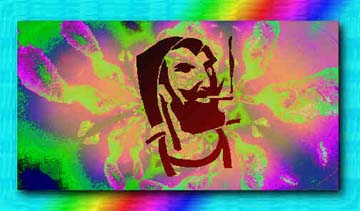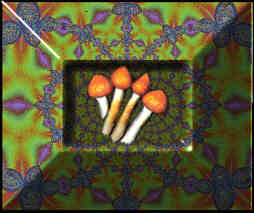 The Mushroom Goddess and Ganja
The Mushroom Goddess and Ganja
Welcome to the rainforest. Here, at the edge of the jungle mat are living the
first proto-humans. This is the boundary between animal consciousness and human
consciousness. In this biological niche the transformation of consciousness
begins. The early hominids found that certain mushrooms created magic in their
lives. This new perception engendered a new kind of thinking for them.
Psylocybin and other psychedelics open the mind to new dimensions and allow the traveller to see the underlying system of our world, and to confront inner mental structures with new sincerity. The psychedelic mind sees without obstruction our connection to the Earth and all of life.
People have been finding and using plants that change mental states since pre-history.


 The Miraculous Hemp Plant
The Miraculous Hemp Plant  Cannibis is actually a psychedelic, and is erroneously classed as a narcotic
by the government.
Cannibis is actually a psychedelic, and is erroneously classed as a narcotic
by the government.
Hemp has many uses. The stems of the plants consist of strong fiber which
can be used to make paper, fabric, or rope, and for many, many years was used
for just those purposes.The Declaration of Independence was written on paper
made from Hemp.
Until 1937, hemp seed oil was the most widely used oil in paints and varnishes. Before 1883, 75 to 90 percent of all paper was made from hemp fiber. (Hemp paper is superior in quality to wood paper lasting four times longer.)
The USDA estimated that the fiber from one acre of hemp could replace the fiber from one acre of trees, and that hemp paper would require only one-seventh to one-fifth the quantity of sulfur-based, acid chemical pollutants in its production process. And of course, an acre of hemp can be grown to maturity in a few months, a fraction of the time it takes to grow trees.
#13 Hemp
is also mildly psychedelic, and it is for this reason that many people smoke
it, or eat it. (In Jamaica and India, they make delicious candies with it.)
It imparts some of the awareness brought on by the stronger psychoactive plants,
but in a milder, easier to cope with manner. It is medicine,
though, and like anything else, should not be abused, but used in moderation.
It is true that some people abuse Marijuana and use it as an escape. But this is not a problem with the substance. (Pot may be psychologically addictive in some cases, but it is not physically addictive.) In the cases of psychological addiction, anything could be used to fill that need- alcohol, television, sex, netsurfing, shopping, complaining-- it is a problem with the user, not the substance. If you're stoned more of the time than you're not stoned, then it's no longer an unusual experience, it's abuse. And, you're filling your lungs with resin- the stuff that clogs your pipe can stop your heart- and it's not really worth it. Find a way to eat your ganj.
Other things, like opium, heroin or tobacco, are physically addictive, and this gives a whole new meaning to the concept 'gateway drug'. Marijuana is accused of causing apathy, but again, this is a problem that was there before the person toked up.

They defame the psychedelic experience with clucking indignation but they dare not call it subversive outright for fear of being asked what it is it subverts.
This would bring attention to the shortcomings of the dominator culture. We would have to shift the focus, and look at the soul-killing bottom-line mentality that seethes around us. We would have to look at our shattered families, our sterile shopping malls, our market-analyzed, media-regurgitated, paved and shrink-wrapped world.
People growing their own reefer and sharing in communities does not fit in with the money-power conglomerate's plans.











